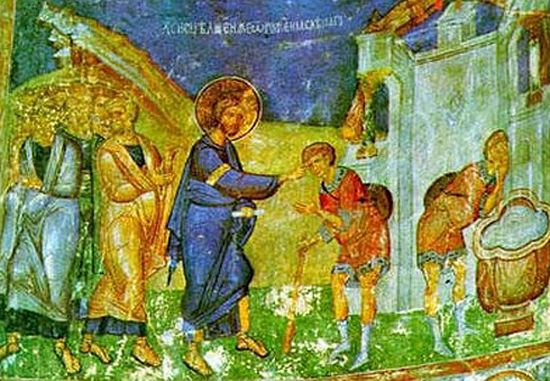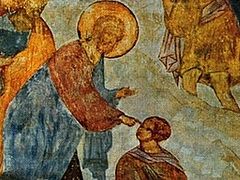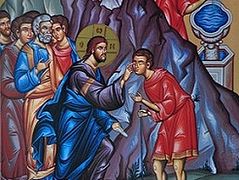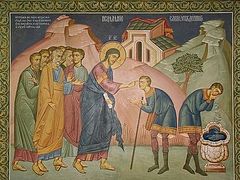It is so easy for people to be blind to the truth about themselves. It is not hard to notice when others do not see the truth about what they do, but it is often quite difficult to notice our own blindness. If we are honest, we will acknowledge that we are quite skilled in shutting our eyes to uncomfortable truths. That should not be surprising, for we are inhabitants of a world darkened by sin and death. Like the man in today’s gospel lesson, we are all blind because we lack full spiritual clarity; and we cannot simply give ourselves the ability to behold the truth perfectly. Unfortunately, we often prefer the darkness of our impaired vision to the brilliant light of Christ’s empty tomb.
The blind man in today’s gospel did not even know that Jesus Christ was the Son of God at the time of the miracle. He apparently did not even ask Him for healing. Instead, the Savior was simply doing the work of His Father as the Light of the world when He restored his sight. The healing of the blind man is an icon of Who Christ is, a sign of what happens when the Son of God shares His life with us. Christ spat into the ground, anointed the man’s eyes with the clay, and told him to wash. These details reflect that the Lord in His Incarnation truly entered into our life as the God-Man, becoming in His humanity one of those created from the dust of the earth even as He remains fully divine. It is through the washing of baptism that we put Him on like a garment and enter into His death in order to rise to the new life for which He created us in the first place. His glorious resurrection on the third day is the fulfillment of His restoration and healing of humanity in the divine image and likeness. In Him, our blindness dies that His words may be fulfilled in us: “Blessed are the pure in heart, for they shall see God.” (Matt. 5:8)
Remember how dark it was at the Pascha service when one candle was lit with the words: “Come receive the Light from the Light and glorify Christ, Who is Risen from the dead.” And then after we sang the Lord’s resurrection outside in candle light, we returned to a brilliantly lit church all decked out in white. Not only is Pascha a celebration of Christ’s resurrection, but also of ours through Him. And that resurrection is not simply a future hope, but already a present reality when we find healing from the blinding power of sin and death in our lives. His resurrection has made it possible for us to participate in the light-filled joy of holiness for which He breathed life into us in the first place. It has opened the eyes of our souls to His glory.
Our epistle reading provides us with another icon of what it looks like when the darkness is overcome by light. The jailer was ready to kill himself rather than endure the penalty that awaited him for letting his prisoners escape after the earthquake. In the brutal world of the Roman Empire, a cruel death awaited him for losing his captives. The man was so shocked when St. Paul assured him that they were all still in their cells that he asked how to find salvation. Christ’s resurrection destroyed the prison of Hades, opened its doors, and set its prisoners free. Now in this miracle, a man who was literally a slave to death had the eye of his soul opened to the light. He was set free from despair, received the washing of baptism, and began a new life.
The jailer may have known nothing about Jesus Christ before the earthquake, even as the blind man did not know that Jesus Christ was the Son of God until after his sight was restored. One said, “What must I do to be saved?” and the other asked “And Who is, He, Sir, that I may believe in Him?” Here we see that true spiritual knowledge of Christ is Christ Himself. By His merciful initiative, He enables us to participate in Him, to experience and know Him by grace. The Lord gave neither of these men mere ideas, rules, or feelings. No, He made them true participants in life-changing spiritual truth, in His own divine energies. He is the Light that they beheld. He released them from the dark prisons they had known.
In these last days of the season of Pascha, we must learn from their examples to open the eyes of our souls as fully as possible to the healing light of the Savior. None of us has perfect knowledge of our sins, of course, but can we all name some fairly obvious ways in which blindness has remained in us. By virtue of putting on Christ in baptism and being filled with the Holy Spirit in chrismation, we all have the spiritual clarity to know generally in what ways we have chosen to remain in the dark prison of the tomb. The good news of Pascha is that Christ has shattered the doors and chains of that prison. He has opened the eyes of us who have always been blind. He has become one of us so fully that He has made even death itself a passage way to life. He has made even the darkest night radiant with His divine glory.
As hard as it may be to believe, the Lord enables each of us to behold and shine with His holy Light. The more that we embrace Him through faith, love, and repentance, the clearer vision we will have of the remaining spots of darkness in our lives. Keep in mind that great saints do not pat themselves on the back about becoming more holy; to the contrary, they are all the more aware of their sins and their constant need for mercy. They know the truth about themselves more clearly before the infinite holiness of God, which inspires them to deep humility.
We must not fall prey, then, to the temptation to discouragement when we catch a glimpse of the darkness that is still in us. Due to our pride, we may want to abandon the serious pursuit of the Christian life when growing spiritual health enables us to see our own sinfulness more clearly. That is the problem with better vision: we may not like what we see. Due to our sloth and laziness, we may want put aside prayer, fasting, forgiveness, serving our neighbors, or other spiritual disciplines because they require effort and we do not do them particularly well. And the more we advance in them, the more we will see how much room we have for growth.
When such temptations arise, we must remember that our goal is not to accomplish anything that can be measured according to the standards of this world, for we seek to experience something different from anything else in this life. To behold the divine glory as we share in the life of Christ is an eternal goal, a transcendent reality that cannot be compared with anything else. It is true, real, spiritual experience and knowledge. The full opening of our spiritual eyes is another way of speaking of the purity of heart that, as Christ said, enables us to see God.
Our awareness of the darkness in our lives is simply a realistic reminder that we have an infinitely long way to go in the journey to theosis. Instead of giving up, we must use our failings and struggles as inspirations to press on in obedience to the only One Who has conquered sin and death, the only One Who has united divinity and humanity in His own Person. He is the Light shining in the darkness of this world and of our own sick and weak souls. Though it is not easy, we must continue to do what it takes to open ourselves more fully to His brilliant light. As those who have beheld the glory of His resurrection, returning to the dark prison of the tomb is simply not an option. Instead, we must keep moving further into the Light, into Him, trusting that He is still at work giving sight to the blind and setting free the prisoners of sin and death. And, yes, that includes you and me.




